December 19, 2024
Americans Want the Right to Control Their Online Data
Widespread Support for Regulating Social Media
Jeb Bell, Head of Research and Strategic Insights, Project Liberty Foundation
Jessica Theodule, Research Manager of Strategic Insights, Project Liberty Foundation
Many Americans do not feel they are in control of the personal information that social media and other online companies collect about them. They are eager to see the situation change and tip the balance of power in favor of citizens, as opposed to the large platforms that dominate much of the social web today, according to a new nationally representative survey by Project Liberty Institute.
When asked about steps that could provide citizens a greater voice and choice about how their personal data is collected, used and shared, an overwhelming majority of Americans support the creation of a national data privacy law to govern how social media and other online companies use people’s data. Support is also strong for giving people the right to delete personal information and to opt out of targeted advertising. In addition, most Americans want the freedom to “vote with their feet” and easily switch from one social media platform to another – without sacrificing the digital network of family, friends and followers they have built over months, if not years.
These are among the key findings from a survey of 1,024 Americans ages 18 and above, conducted between November 8-11 (see methodology section for full details).
The poll also finds that along with improved data rights, Americans value data protections, including a requirement that social media and other online companies set the default privacy settings for children at the highest possible levels.
Most Americans don’t feel in control of their data
Most Americans feel they are not in control of the personal information collected about them online. Two-thirds or more say they have little or no control over the personal data collected by social media platforms (67%) or online companies, such as search engines and shopping platforms, (70%). Barely 1-in-10 claim to have a “great deal” of control, while 21% describe having some control.
Those with higher levels of education tend to feel less in control of the personal data collected by both social media and other online companies. For instance, 71% of Americans with a bachelor’s degree or higher say they have little control over the data collected about them by social platforms, while 75% say the same about the personal information collected by other online companies. This compares with a slightly smaller majority of those with only some college who feel they lack control over the personal information collected by either social platforms (61%) or other online companies (65%).
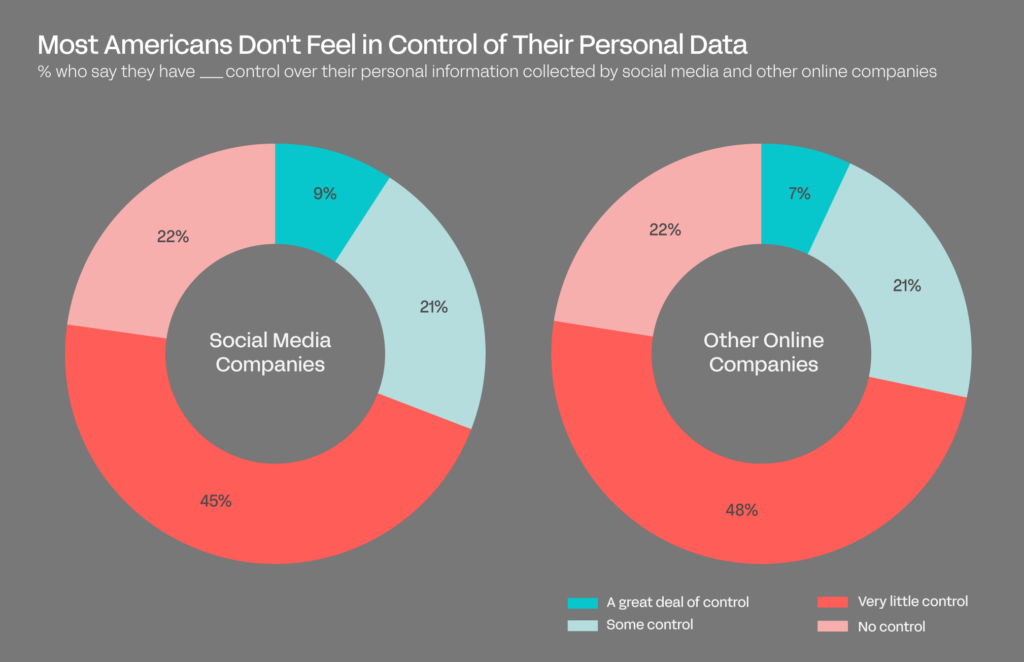
With regard to the types of personal information that Americans are most eager to safeguard, a recent Project Liberty Institute report revealed that majorities of Americans view the content of texts and emails (68%), their geo-location (63%), the names of family and friends (62%) and data on their health and medications (56%) to all be “very sensitive.” By contrast, fewer than half associated the same level of sensitivity with their browsing history (46%), birthdate (44%), online searches (41%), political candidate support (30%) or online shopping history (21%).
AI will only worsen the lack of control
More than 4-in-5 Americans (85%) believe that AI will increase the risk that their personal information will be collected, shared, and used by companies without their knowledge. Only 12% believe AI will make it possible for individuals to be more in control of their personal data.
Americans with higher levels of education tend to be more skeptical of AI’s promise. More than 9-in-10 with a college degree believe AI will increase the risk of personal information being collected without their knowing (92%). Among Americans with high school degrees or less, 77% share this concern.
Young adults ages 18–49 are slightly more optimistic about AI’s impact, but even among this group just 28% believe AI will make managing personal information easier. Older Americans are even less upbeat about AI: only 17% think it will help people exercise greater control over the personal information collected by social media and other online companies.
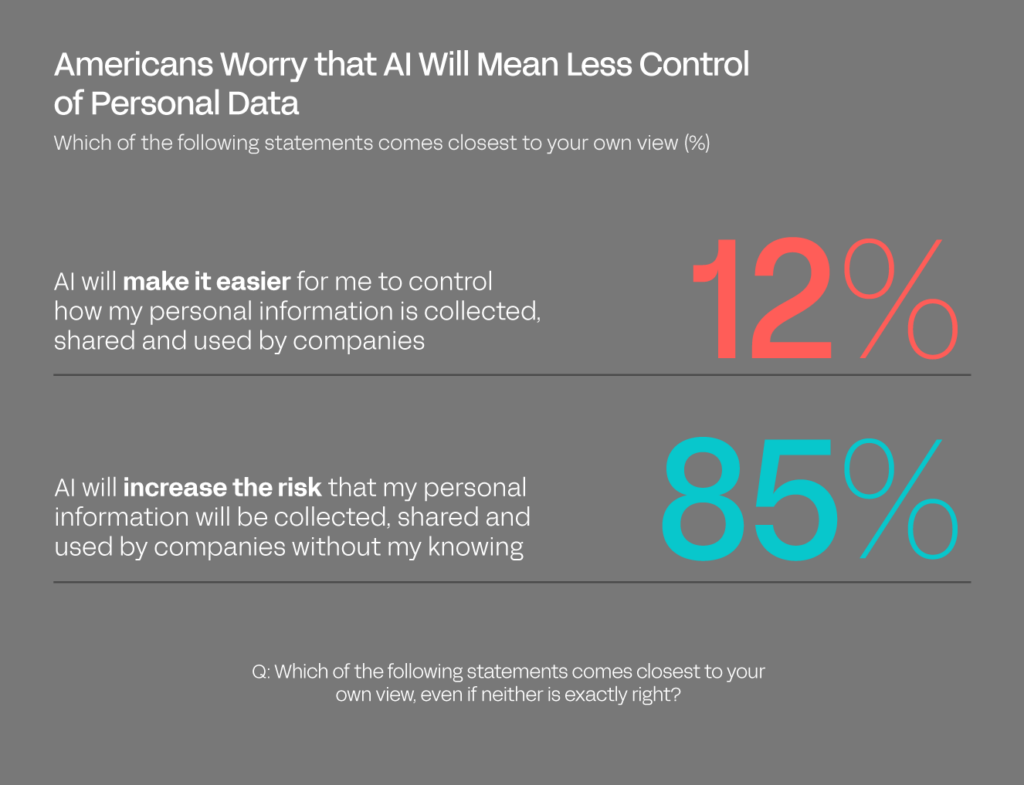
Few think they can influence online policies
At the same time that many Americans feel that their personal data is beyond their control, majorities also feel excluded from the decisions made by major platforms – such as Facebook, X (formerly Twitter) or TikTok – to regulate online speech and behavior. More than 7-in-10 Americans (73%) say they have little or no influence on such decisions, compared with a quarter who claim they have “some” (20%) or “a great deal” of influence (5%).
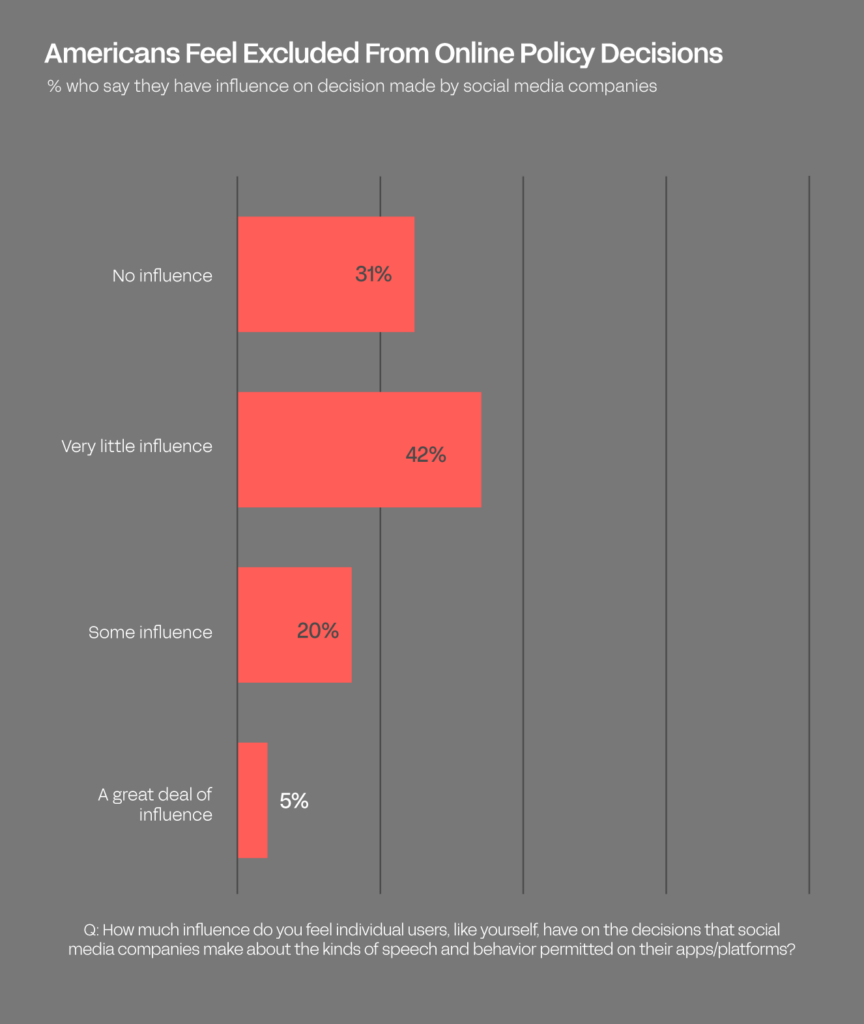
Younger adults ages 18-34 are more likely than their older counterparts, especially those 65 and above, to say they have at least some influence over the decisions made by social media companies to regulate speech and behavior (32% vs. 14%). But even among young adults, a clear majority (64%) feel they have little or no voice in the policies implemented by major platforms.
Similarly, those with high school education or less are more likely than those with a college degree to feel they have at least some influence over the regulation of speech and behavior on social media platforms (28% vs. 18%). But again, even among those without any college education a strong majority (69%) feel more or less powerless to influence the decisions made by private social media companies.
A perceived lack of influence over the policies regulating online speech and behavior is pervasive across the political spectrum: similar majorities of Republicans (74%), Democrats (72%) and Independents (76%) all agree they have little or no influence over the decision made by social media companies.
Majorities want clear rights, more control over their data
Americans want clearer rights and more control over their online data and lives. An overwhelming 9-in-10 Americans support the creation of a national privacy law that would set standards for what social media and other online companies do with all the personal information their products and services collect.

Backing for such a measure is consistently strong across the political spectrum: 94% of Democrats favor a national privacy law, as do 92% of Republicans and 90% of Independents. And among each political camp, majorities (55%-67%) strongly support legally regulating what social media and other online companies can do with the personal information they collect.
Support for a national privacy law is also strong across age groups, although backing for such a measure is more pronounced among those 50 and older (96%), than among those 18-49 (85%).
Algorithmic transparency
Along with data rights, Americans want greater transparency into the way algorithms shape online experiences. Eight-six percent would support government rules requiring social media and other online companies to explain how their algorithms target people with content and advertising.
Support for such a measure is similarly widespread among Republicans (89% support), Democrats (89%) and Independents (86%). In each instance, more than half strongly support increased transparency regarding the use of algorithms.
Americans 50 and older are somewhat more enthusiastic than 18-34 years old about requiring companies to explain their use of algorithms (90% vs. 82%). And those with at least some college are more supportive of requiring algorithmic transparency than those with a high school education or less (90% vs. 80%).
Right to delete data and opt out of targeted advertising
Other measures backed by an overwhelming majority of Americans include government rules that would require social media and other online companies to allow people to fully delete their personal information (91% support) or opt out of targeted advertising (90%).
Similar to a national privacy law, these measures enjoy high levels of support across the political spectrum. Clear majorities of Democrats (78%), Republicans (75%) and Independents (77%) strongly back government regulations that would guarantee that people can delete their personal online data. Nearly the same level of cross-partisan support is evident for enabling people to opt out of targeted advertising – Democrats (76% strongly support), Republicans 73%) and Independents (73%).
Support for legally enshrining the right of people to either delete their personal online data or opt out of targeted advertising is consistently robust across age groups and education levels – with 85% or more backing such measures, including two-thirds or more across age and education cohorts who strongly back such government rules.
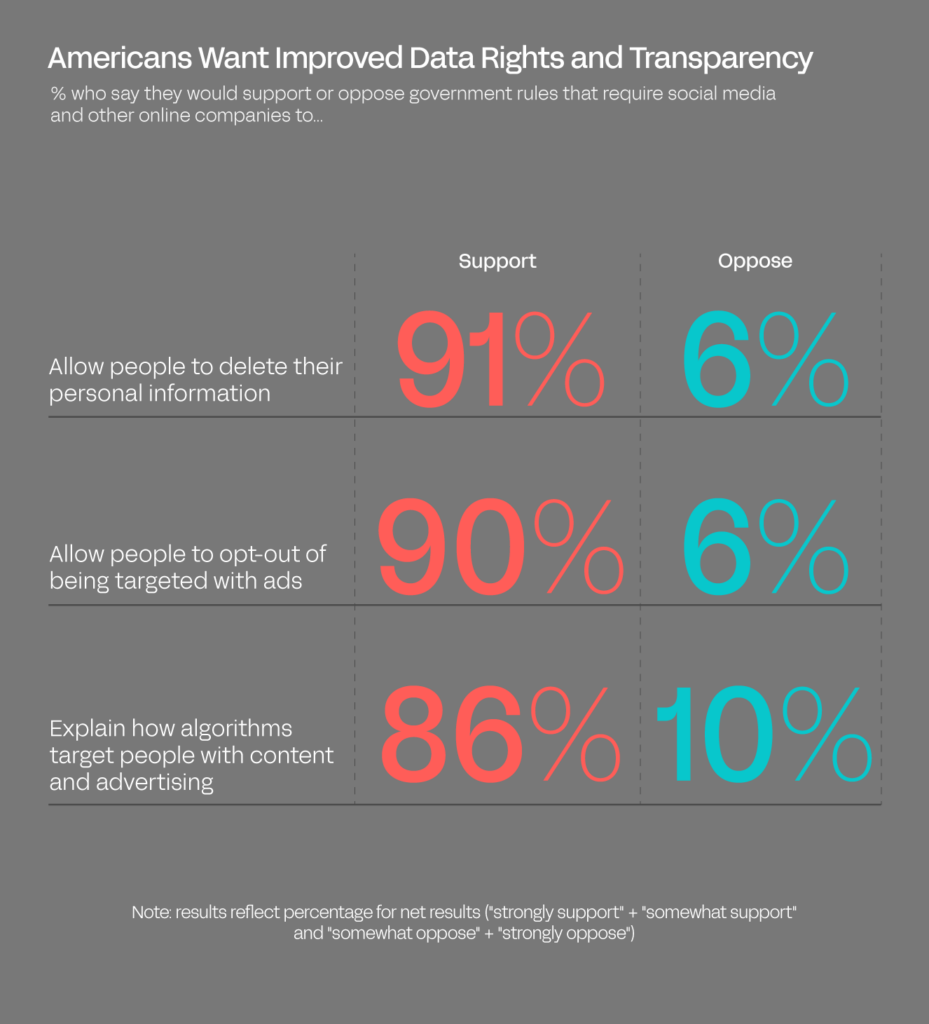
Desire for freedom of choice
Americans want more than the ability to delete data or opt out of advertising; they want the freedom to choose between social media platforms – and to do so in a way that does not disrupt the social networks they have taken months, if not years, to build. Roughly 7-in-10 Americans strongly agree (24%) or somewhat agree (47%) that social media companies should make it easier for individuals to keep their network of family, friends and followers if they decide to switch to a different social media app. Just a quarter of Americans either somewhat disagree (18%) or strongly disagree (7%).
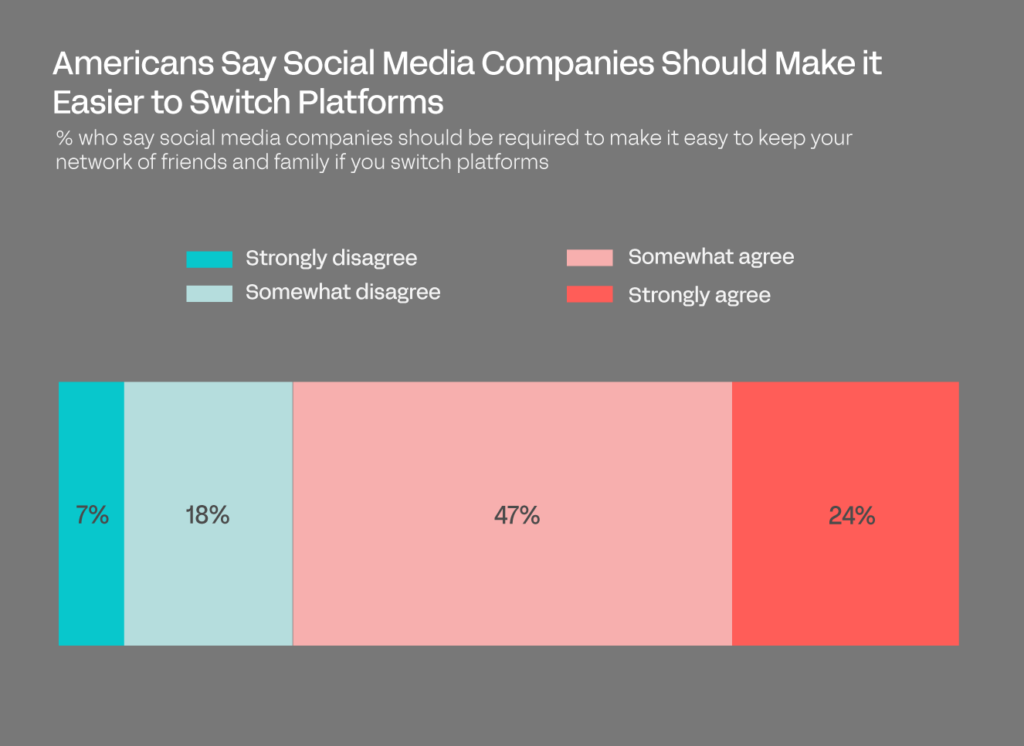
Support for lowering the social costs of switching platforms is strong across party lines: 74% of Republicans support such a change, as do 72% of Democrats and 68% of Independents.
Backing for such a measure is also roughly consistent across education levels. Views, however, do vary somewhat by age. Among American adults ages 18-24, 63% believe social media companies should make it easier to keep your social network intact when switching platforms, compared with 74% of Americans 35 and older who hold this view.
Protecting kids is essential
Just as Americans overwhelmingly favor a national privacy law that clarifies what social media and other online companies can – and cannot do – with the personal information they collect, Americans strongly favor safeguards to protect the online data privacy of children. Nine-in-ten Americans (90%) would support government rules that would require social platforms and online businesses to set the default privacy settings for children to the highest levels possible.
Republicans, Democrats and Independents are nearly identical in their levels of support for such a measure (92-93%), – with 76% of Democrats, 75% of Republicans and 70% of Independents strongly backing high-privacy settings as an online default for children.
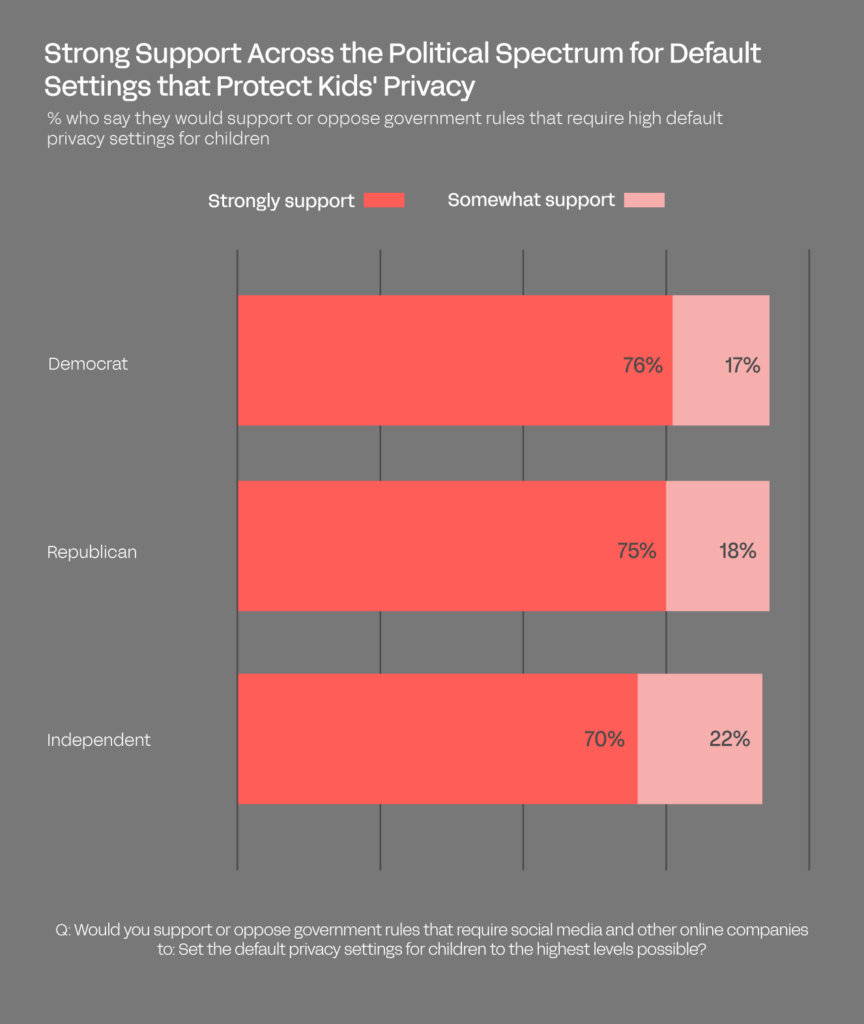
Support for child-focused protections is nearly unanimous among Americans with a college degree (96%, including 76% strongly support), and only slightly less pronounced among those with a high school education or less (90%; 67% strongly). Americans over 65 years of age are slightly more fervent than those 18-34 (93% vs. 88%) in their support for the highest default privacy settings possible for children.
Previous polling by Project Liberty Institute found that roughly 7-in-10 American adults ages 18-74 expressed concern that children’s use of social media, at least, would lead to the sharing of too much information about their personal life. The same poll found that 88% of Americans felt that social media companies should be accountable for kids’ online safety, including 59% who said the companies should bear a “great deal” of responsibility for the safety of children.
Methodology
This Ipsos poll was conducted November 8-11, 2024, on behalf of the Project Liberty Institute using the KnowledgePanel®. This poll is based on a representative sample of 1,024 U.S. residents, age 18 or older.
The study was conducted in English. The data were weighted to adjust for gender by age, race and ethnicity, census region, metropolitan status, education, household income, and political party affiliation. Political party affiliation benchmarks are from the 2024 NPORS annual survey. The demographic benchmarks came from the 2024 March supplement of the U.S. Census Bureau’s Current Population Survey (CPS).
- Gender (Male, Female) by Age (18–29, 30–44, 45-59 and 60+)
- Race/Hispanic Ethnicity (White Non-Hispanic, Black Non-Hispanic, Other, Non-Hispanic, Hispanic, 2+ Races, Non-Hispanic)
- Education (Less than High School, High School, Some College, Bachelor degree, Master’s degree or above)
- Census Region (Northeast, Midwest, South, West)
- Metropolitan status (Metro, non-Metro)
- Household Income (Under $25,000, $25,000-$49,999, $50,000-$74,999, $75,000-$99,999, $100,000-$149,999, $150,000+)
- Political Party Identification (Democrat, Lean Democrat, Republican, Lean Republican, Independent/Something else)
The margin of sampling error is plus or minus 3.2 percentage points at the 95% confidence level, for results based on the entire sample of adults. The margin of error takes into account the design effect, which was 1.12 for all adults. In our reporting of the findings, percentage points are rounded off to the nearest whole number. As a result, percentages in a given table column may total slightly higher or lower than 100%. In questions that permit multiple responses, columns may total substantially more than 100%, depending on the number of different responses offered by each respondent.